
As boys going to sea immediately become nautical in speech, walk as if they already had their "sea legs" on, and shiver their timbers on all possible occasions, so I turned military at once, called my dinner my rations, saluted all new comers, and ordered a dress parade that very afternoon.
This quote vividly captures the phenomenon of adopting new behaviors and language when immersed in a different environment or community. The speaker likens the process of adjusting to military life to how boys heading out to sea quickly adopt nautical speech and mannerisms, such as walking as if they possess their 'sea legs'—a term signifying certainty and confidence on a rolling ship—and 'shivering their timbers,' which evokes old maritime expressions about shivering or shaking in fear or anticipation. The transition from civilian to military life is portrayed as almost immediate and instinctive; the individual adopts the language ('rations') and customs (saluting, commanding dress parades) of the new environment with eagerness. This highlights human adaptability and how social settings influence identity and behavior. It also emphasizes the sense of belonging and discipline that comes with immersing oneself fully in a new role. Such changes are often driven by the need to align with a group’s norms quickly, fostering cohesion and facilitation of collective routines. The quote resonates on a broader level about human nature, illustrating how identities are malleable and how environment and circumstances can swiftly reshape our habits, language, and outlooks. Embracing a new role or environment often requires adopting new language and behaviors, which can provide a sense of confidence and camaraderie, ultimately helping individuals integrate more seamlessly into their new community.






